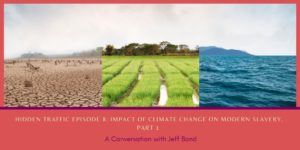
Jeff Bond is the Director of Strategy and Design for the Global Fund To End Modern Slavery, an international fund that mobilizes resources, evidence and partnerships to end modern slavery. He is passionate about making a positive social and business impact, and has spent a great deal of time in other countries broadening his perspective. Jeff and host Gwen Hassan discuss how the effects of climate change impact modern slavery around the world.
There are two broad ways in which climate change drives modern slavery: increased vulnerability and forced labor. Populations that are disproportionately affected by climate change in the way of floods, landslips, and a lack of water become more vulnerable to modern slavery. As for forced labor, this primarily occurs in the realm of clean energy supply chains. The technological solutions that will be critical in addressing climate change have issues related to exploitation. Cobalt mining in the Democratic Republic of Congo, nickel mining in Guatemala, and solar panels in China are just a few examples. Legislation such as Germany’s Supply Chain Due Diligence Act and the Forced Labor Prevention Act in the US are coming into effect to challenge this.
Climate change, human trafficking, and modern slavery are intricately connected, and they cannot be separated from each other. They are connected to various corporate relationships, and so it’s very important for companies to remember the moral obligations they have to their workers. Companies have to make sure that they’re operating ethically and not facilitating modern slavery.
Resources
Jeff Bond on LinkedIn
Global Fund To End Modern Slavery


